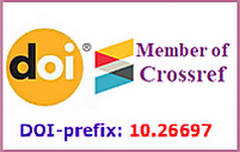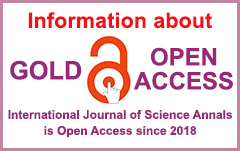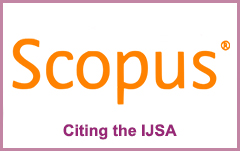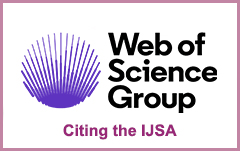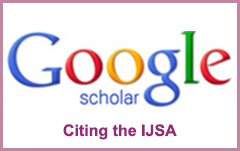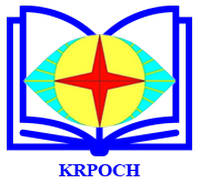Training of Future Specialists in Higher Educational Institutions
Melnyk Yu. B.1,2, Pypenko I. S.2,3
| 1 National Academy of the National Guard of Ukraine, Ukraine
2 Kharkiv Regional Public Organization “Culture of Health”, Ukraine
3 Scientific Research Institute KRPOCH, Ukraine
|
Abstract
Background and Aim of Study: The research deals with studying issues concerning training of specialists in high school and the student’s role in this process. The perspective trends of training specialists in higher educational institutions are determined. They relate to such, where the university is a configuration part of much bigger establishments and processes and where it corresponds to the social and individual demands of the youth. The aim of the study: to ascertain competences, pedagogic technologies and methods, demanded by cadets and students, as well as to forecast perspective trends of studying in higher educational institutions.
Material and Methods: A set of methods is used to study issues of training specialists in high school: collection of information, systematisation, rating assessment, analysis and results interpretation. The dispersion coefficient of Kendall concordance is calculated, its significance is proved on the basis of determining Pirson’s criterion for the significance level of 5% and 1%. The research was held in the academic years of 2013-2018 on the basis of National Academy of National Guard of Ukraine within the framework of the subject “University Education”. The average number of respondents was 535 people (35 groups), who studied at the Humanities Faculty, Technical Faculty, the Faculty of Economics and Management.
Results: It is specified that there is a tendency of decreasing number of students who want to study in higher educational institutions. The demand of the student youth is determined for competences, pedagogic technologies and methods which are mostly required in high school. It is proposed to specify competences classification and content of the notions “professional competences” and “special competences”.
Conclusions: On the basis of modern scientific and technical achievements, application of educational logistics and social demand, the main tendencies and future trends of training specialists in higher educational institutions in IT-sphere, technical, military, economic, medical and educational fields are forecast.
Keywords
high school, training of specialists, student youth, professional competences, special competences, educational logistics.
References
Altbach, Ph. G., & Knight, J. (2007). The internationalization of higher education: motivations and realities. Journal of Studies in International Education, 11, 290–305. doi:10.1177/1028315307303542
Bates, A. W., Bates, T., & Sangra, A. (2011). Managing technology in higher education: Strategies for transforming teaching and learning. San Francisco: Jossey-Bass.
Boyatzis, R., Goleman, D., & Rhee, K. (2000). Clustering competence in emotional intelligence: Insights from the Emotional Competence Inventory (ECI). San Francisco: Jossey-Bass.
Burganova, R. I., Abdugalina, S. E., & Shaiheslyamova, K. O. (2016). The professional competence formation in the training process in higher educational institution. International Journal of Environmental and Science Education, 11(10), 3629-3639.
Frohberg, D., Goth, C., & Schwabe, G. (2009). Mobile learning projects: a critical analysis of the state of the art. Journal of Computer Assisted Learning, 25, 307-331.
Haug, G. (1999). Trends and issues in learning structures in higher education in Europe. In G. Haug, & J. Kirstein [Eds.], EUA Trends and learning structures in higher education reports series (pp. 3-18). Retrieved from https://www.aic.lv/ace/ace_disk/acebook/Trends_all.pdf
Kalaian, S. A. (2017). Pedagogical approaches for the 21st century student-driven learning in STEM classrooms. In N. Alias, & J. Luaran (Eds.), Student-Driven Learning Strategies for the 21st Century Classroom (pp. 72–86). Hershey, PA: IGI Global. doi:10.4018/978-1-5225-1689-7.ch006
Keegan, D. (2013). Foundations of distance education. London: Routledge.
Laredo, Р. (2007). Revisiting the Third Mission of Universities: Toward a Renewed Categorization of University Activities? Higher Education Policy, 20(4), 441–456.
Lodico, M. G., Spaulding, D. T., Voegtle, K. H. (2010). Methods in educational research: From theory to practice. San Francisco: Jossey-Bass.
Melnyk, Yu. B. (2016). Pedahohika vyshchoi shkoly: v skhemakh i tablytsiakh [High school pedagogy: in charts and tables]. Kharkiv: KRPOCH. doi:10.26697/9789669726063.2016 [in Ukrainian]
Melnyk, Yu. (2017). Study of trends of students’ demand for the formation of competences by higher educational institutions. Science and Education, 5, 128–134. doi:10.24195/2414-4665-2017-5-22
Melnyk, Yu. B., & Pypenko, I. S. (2017). Sutnist i vzaiemozviazok poniat “osvitnia lohistyka”, “pedahohichna lohistyka” ta “navchalna lohistyka” [The essence and interrelation of the concepts “educational logistics”, “pedagogical logistics” and “teaching logistics”]. In L. М. Pelepeychenko, & Yu. B. Melnyk (Eds.), Aktualni pytannia osvity i nauky – Current issues of education and science (pp. 9–17). Kharkiv: KRPOCH. doi:10.26697/9786177089000.2017.9 [in Ukrainian]
Melnyk, Yu. B. (2017). Rekomendatsii do reitynhovoho otsiniuvannia naukovo-pedahohichnykh pratsivnykiv [Recommendations for rating assessment of scientific and pedagogical workers]. In Т. V. Kolbina, & Yu. B. Melnyk (Eds.), Psykholoho-pedahohichni problemy stanovlennia suchasnoho fakhivtsia – Psychological and pedagogical problems of modern specialist formation (pp. 92–98). Kharkiv: KRPOCH. doi: 10.26697/9789669726087.2017.92 [in Ukrainian]
Meterbayeva, K., Karmenbayeva, Zh., Tleulinova, M., Auhadieva, Z., & Egimberdieva, G. (2015). Pedagogical bases of professional competence formation of the future specialists. Procedia – Social and Behavioral Sciences, 185, 240–243. doi:10.1016/j.sbspro.2015.03.465
Olsen, J. P. (2007). The institutional dynamics of the European University. In P. Maassen, & J. Olsen (Eds.), University Dynamics and European Integration (pp. 25–54). Luxembourg: Springer. doi:10.1007/978-1-4020-5971-1
Park, Y. (2011). A pedagogical framework for mobile learning: categorizing educational applications of mobile technologies into four types. International Review of Research in Open and Distance Learning, 12(2), 78–102.
Sahin, S. (2008). The relationship between student characteristics including learning styles, and their perceptions and satisfaction in web-based courses in higher education. Turkish Online Journal of Distance Education, 9(1), 123–138.
Sallis, E. (2014). Total quality management in education (3rd ed.). London: Taylor and Francis.
Sánchez, A. V., & Ruiz, M. P. (Eds.). (2008). Competence-based learning. A proposal for the assessment of generic competences. Bilbao: University of Deusto.
Schmidt, D. A., Baran, E., Thompson, A. D., Mishra, P., Koehler, M. J., & Shin, T. S. (2009). Technological Pedagogical Content Knowledge (TPACK): The Development and Validation of an Assessment Instrument for Preservice Teachers. Journal of Research on Technology in Education, 42(2), 123–149. doi:10.1080/15391523.2009.10782544
Tuning Association. (2010). A tuning guide to formulating degree programme profiles including programme competences and programme learning outcomes. Bilbao: Groningen and The Hague. Retrieved from https://www.unideusto.org/tuningeu/images/stories/documents/Tuning_Guide._Degree_programme_profiles.pdf.
Valeeva, R. A., & Bushmeleva, N. A. (2016). Forming analytical competency of higher school students. International Electronic Journal of Mathematics Education, 11(8), 3137-3148. Retrieved from https://www.iejme.com/makale/925.
Wagenaar, R. (2014). Competences and learning outcomes: a panacea for understanding the (new) role of Higher Education? Tuning Journal for Higher Education: Competence-based learning: a global perspective, 1(2), 279–302. doi:10.18543/tjhe-1(2)-2014pp279-302
Wang, M., Shen, R., Novak, D., & Pan, X. (2009). The impact of mobile learning on students’ learning behaviours and performance: Report from a large blended classroom. British Journal of Educational Technology, 40(4), 673–695.
Wiersma, W., & Jurs, S. G. (2005). Research methods in education: An introduction (9th ed.). Cambridge: Pearson.
Zakharchenko, V. M., Luhovyi, V. I., Rashkevych, Yu. M., & Talanova, Zh. V. (2014). Rozroblennia osvitnikh prohram [Development of educational programs]. Kyiv: DP “NVTs “Priorytety”. [in Ukrainian]
Zakon Ukrainy “Pro vyshchu osvitu”: pryiniatyi 1 lyp. 2014 roku № 1556-VII [Law of Ukraine “On higher education” from July 1 2014, № 1556-VII]. (2014, August 6). Holos Ukrainy – Voice of Ukraine, 148, pp. 4-67. [in Ukrainian]
Information about the authors:
Melnyk Yuriy Borysovych – https://orcid.org/0000-0002-8527-4638; Doctor of Philosophy in Pedagogy, Associate Professor, Professor of the Department of Psychology and Pedagogy; National Academy of the National Guard of Ukraine; Founder and Chairman of the Board, Kharkiv Regional Public Organization “Culture of Health”, Kharkiv, Ukraine.
Pypenko Iryna Sergiivna – https://orcid.org/0000-0001-5083-540X; Doctor of Philosophy in Economics, Associate Professor, Scientific Research Institute KRPOCH, Kharkiv, Ukraine.
| |
Cite this article as:
APA
Melnyk, Yu. B., & Pypenko, I. S. (2018). Training of future specialists in higher education institutions. International Journal of Science Annals, 1(1-2), 4–11. https://doi.org/10.26697/ijsa.2018.1-2.01
Harvard
Melnyk, Y. B. & Pypenko, І. S., 2018. "Training of Future Specialists in Higher Educational Institutions". International Journal of Science Annals, [online] 1(1-2), pp.4-11. viewed 30 November 2018, https://culturehealth.org/ijsa_archive/ijsa.2018.1.01.pdf
Vancouver
Melnyk Y. B., Pypenko І. S. Training of Future Specialists in Higher Educational Institutions. International Journal of Science Annals [Internet]. 2018 [cited 30 November 2018];1(1-2):4-11. Available from: https://culturehealth.org/ijsa_archive/ijsa.2018.1.01.pdf https://doi.org/10.26697/ijsa.2018.1-2.01







